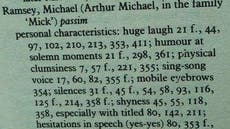Mea Culpa: a plea for the preservation of irregular verbs
Questions of usage and style in The Independent this week, including one of the words on George Orwell’s banned list


Theresa May besought European leaders to give her a deal she can sell to the British people, we reported this week. Except that we didn’t: we wrote “beseeched”. Shouldn’t that be “besought”, Philip Nalpanis wrote to ask – “or is that an archaism”?
My view is that it is archaic, and so unfamiliar to so many readers that we were right to use “beseeched”. Guy Keleny, my predecessor, ran a Campaign for the Preservation of Irregular Verbs, but, sadly, I think this one is lost.
Beseech means to ask urgently or fervently, and comes from “be-” as an intensifier (as in belabour and besiege) and secan, Old English root of “seek”, meaning try to find or ask for (as in seek help). The past tense is usually beseeched these days, although besought used to be more common, in the same way that the past of seek is sought.
It is a shame to lose an irregular verb, but courtesy to the reader comes first. If we had written the sentence as above, I think too many readers would have been distracted by it.
Prog rock: We described Tom Steyer, who has announced a $10m campaign calling for President Donald Trump’s impeachment, as “the billionaire progressive donor” in a comment article this week. Fair enough. It was the writer’s opinion, and if she wants to call him “progressive” she is entitled to do so. What is more, the article was reproduced from The New York Times, so it would have been wrong to rewrite it in any case.
However, it allows me to repeat one of George Orwell’s warnings against using loaded words – and “progressive” was one of those on his list – in his 1946 essay, “Politics and the English Language”. Steyer is a former hedge fund manager who is now best known as a supporter of environmental causes and of the Democratic Party. The term “progressive” is presumably intended to cover these different, overlapping categories of recipient, but in news reporting it would be better to be specific.
High crimes: The article also uses the word “impeachment” several times, which allows me to lecture our American friends again on how their Constitution works. As I have written before, “impeach” means “charge”, and a president is removed from office – which is what many Americans mean by “impeachment” – only if they are first impeached and then convicted of a “high crime or misdemeanour”.
Neither impeachment nor conviction is likely in Trump’s case, despite Steyer’s endeavours. The first requires a simple majority in the House of Representatives, which is easier to achieve than the second, which needs a two-thirds majority in the Senate. We should always remember that impeachment is only the first stage of removing a president, and that Bill Clinton, for example, was impeached but acquitted in his second term.



Join our commenting forum
Join thought-provoking conversations, follow other Independent readers and see their replies